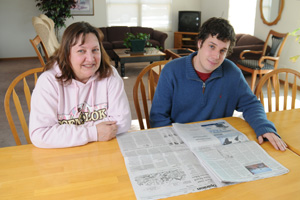
In 2010, Helen Matteson was helping to take a count of her fellow Americans as a United States census taker. The following year, she was counting her blessings when her supervisor, a military veteran, told her about a new program to assist veterans, reservists, National Guard members, and their families in Lake and McHenry counties. Matteson, whose military connections include her ex-husband, two brothers, and three nephews who are entering the military this year, is receiving personal counseling and food pantry benefits thanks to a unique peer-to-peer project through the Lake County Health Department (LCHD) and Illinois Institute of Technology.
“My counselor is available anytime I need to talk,” says Matteson, who sought assistance for coping with the stress of family traumatized by past combat situations in Afghanistan and Iraq. “I had an unrelated crisis and needed somebody to talk to, and she was there for me even for that.”
The five-year program, which made its debut in May 2011 with a $3.75 million grant from the Substance Abuse Mental Health Service Administration, focuses on transforming mental health services for members of the military and their families using a two-pronged approach: it is non-office-based and is administered primarily by veterans of various military operations, including the Vietnam War, the Gulf War, and current conflicts. The program aims to further engage clients in communication, reduce the number of hospitalizations, address issues of homelessness, teach crisis management, and lessen the stigma of mental illness.
“Current research says that our program should be mobile and community-based,” says Jonathon Larson, IIT assistant professor of psychology and co-principal investigator (along with Ted Testa, LCHD behavioral health services director). “Many veterans can’t get to an office so we have vans to meet them at locations where it’s convenient for them. We also take clients to medical appointments and help with relocation. The program is very personalized.”
IIT’s role is to evaluate the qualitative and quantitative data being gathered. Larson says that after the first six months, it’s too early to perform an in-depth analysis, but pilot data on the 50 clients enrolled in the program has yielded information that indicates a great need for quality-of-life improvements-81 percent are unemployed, 42 percent report they are disabled, and 81 percent are living below the poverty level in Illinois.
“We were shocked that not a lot of veterans were receiving VA benefits (only 15 percent report being recipients) and that 40 percent of veterans in the program are women,” says Larson, who is already writing grants that look at the next research questions in the program, while Testa’s group explores policy concerns and finance sources.
For one woman in the program, life has already been transformed.
“I was an absolute wreck when I first started in the program,” admits Matteson. “Now, I’m becoming myself again. My goal is to eventually become an advocate for families of service members.”